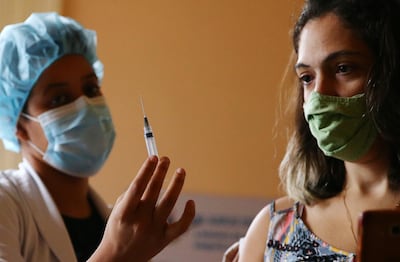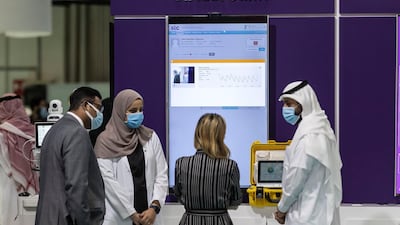A booster shot is the most effective protection against Covid-19 for those who have taken two shots of the Sinopharm vaccine, doctors said at the Arab Health trade exhibition in Dubai.
Dr Gehad ElGhazali, lead immunologist at the government-run Sheikh Khalifa Medical City in Abu Dhabi, reported a "very strong" response in the body's immune system once a double dose of the Sinopharm vaccine was topped up with a booster shot of the Pfizer-BioNTech vaccine.
In Abu Dhabi, the Department of Health is also offering a third dose of the Sinopharm vaccine for those who had a second dose six months ago.
Dr ElGhazali said immunity began to drop six months after a second dose of the Sinopharm shot was administered, but a booster was safe and effective in tests.
“We have seen a very strong immune response when a third booster of Pfizer has been administered following two doses of Sinopharm,” he said.
“When there is natural infection from the virus, we see an immune response after about three weeks, and we see a similar response following a second vaccine dose.”
Research around the world is under way to determine how effective mixing vaccines is in offering greater protection against new variants of Covid-19.
A recent German study looked at subjects receiving one dose of the Oxford-AstraZeneca vaccine, followed eight weeks later by a dose of the Pfizer-BioNTech shot.
Blood samples showed that protection in people given two different vaccines was four times higher than in those who received two doses of the Pfizer shot.
The focus on long-term immunity

Mixing vaccines could provide more options to health authorities treating more vulnerable patients.
"From the beginning, we have observed variance in the immune response," Dr ElGhazali said.
“Those patients with defective T cells or some kind of anaemia have a worse response to the virus.”
T cells aid the body’s production of antibodies to kill off cells infected by the virus.
Covid-19 infections can cause lymphopenia, a disorder that damages T cells and other white blood cells, and is more pronounced in severely ill patients.
Studies have shown the majority of people infected with Covid-19 develop a strong T-cell response, which bodes well for potential long-term immunity against the virus – but that is far from certain.
"Given the nature of this virus, there will be a Sars-CoV 3 and 4, and we just hope it will not pose an existential threat to humans," said Prof Basel Al Ramadi, chairman of medical microbiology at UAE University in Al Ain.
“We only have a few vaccines now, but there are more than 280 under development.
“Most are injectable but a minority are taken orally.
“Ideally we want memory T cells from these vaccines that can control the infection.”
A Phase 3 trial of 1,000 patients in the UAE who had the Sputnik V vaccine will assess the presence of antibodies and T cells four months after receiving the shot.
Prof Al Ramadi said asymptomatic or mild cases of the disease triggered a stronger T-cell response in patients when compared with those with moderate or severe symptoms.
A scarcity of T cells was also reported in older people and those who became ill with Covid-19.
"Although we see antibodies in those who have had the virus, we still do not know for how long they may last," Prof Al Ramadi said.

















